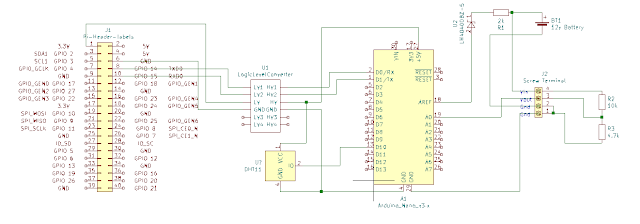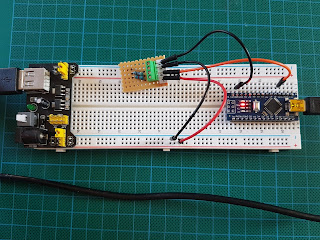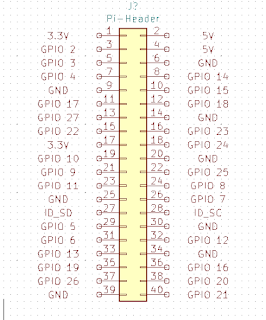Arduino DHT22 readings over serial
Today I am going to add a DHT22 temperature humidity sensor to my existing battery voltage monitor project. Uploading and testing the code is done over USB cable, the HC-05 needs to be disconnected for this to work.
The DHT22 is connected to +5v, gnd and Digital Pin 10, I only chose pin10 as it is convenient for my veroboard layout.
The code for this is very simple :
<code>
#include "DHT.h"
#define DHTPIN 2 // The pin that your DHT is connected to
DHT dht(DHTPIN, DHT22);
void setup() {
dht.begin();
}
void loop(){
float h = dht.readHumidity(); //stores humidity value in float variable h
float t = dht.readTemperature();// temperature value
}
</code>
Don't forget to import the "DHT sensor library" in library manager in the Arduino IDE.
We can then do whatever we need to with the values. I am going to send request them over serial via a HC-05 Bluetooth device from a Python script on a Raspberry Pi. For testing am using a laptop running Linux Mint. Please have a look at my other blog posts if you want more info about the code below.
<code>
#include "DHT.h"
#define DHTPIN 10 // The pin that your DHT is connected to
DHT dht(DHTPIN, DHT22);
const int pinA0 = A0; // Analogue input pin that the battery is attached to
int vBattery = 0; // This will be our voltage reading.
int incomingByte = 0; //
void setup() {
// initialize serial communications at 9600 bps:
Serial.begin(9600);
analogReference(EXTERNAL); // use AREF for reference voltage
dht.begin();
delay(1000);
Serial.println("Request reading by sending a letter");
Serial.println("Pin A0, Battery = b");
Serial.println("Pin D10 DHT, Temp = t, Humidity = h, devide by 100 for value");
}
void loop() {
// read the analogue value:
vBattery = analogRead(pinA0);
delay(250); // No need to stress anything
if (Serial.available() > 0) {
// read the incoming byte:
incomingByte = Serial.read();
if (incomingByte == 98) {
Serial.println(vBattery);
}
if (incomingByte == 116) { //t = temperature
float t = dht.readTemperature();
int(dt) = t * 100; // I need to send an integer over serial not float
Serial.println(dt);
}
if (incomingByte == 104) { //h = humidity
float h = dht.readHumidity();
int(dh) = h *100;
Serial.println(dh);
}
}
}
</code>
The Arduino checks for input on the serial connection, if it detects a 116 or 104 it then requests the value, converts it to an integer and sends it back over the serial connection. I sent t then h and receive the below.
Looking good so far, lets reconnect the HC-05 and edit the Python code to request the values.
<code>
import bluetooth
import time
import sys
bd_addr = "98:D3:61:F6:0B:E8" #mac address of HC-05
port = 1
sock = bluetooth.BluetoothSocket( bluetooth.RFCOMM )
sock.connect((bd_addr, port))
print ("Connected")
sock.settimeout(5.0) #will search for 5 seconds
def readValue(value):
count = 0
data = ""
sock.send(value.to_bytes(8,'big')) #sends passed value over bluetooth to HC-05
while (count < 5): #this ensures we receive the complete variable
rcv = sock.recv(1024) #receives data from the socket
data = data + rcv.decode("utf-8") #bytes to string
if r"\r\n" in str(rcv): #checks for \r\n in the bytes value
return int(data)
count += 1
#print(readValue(98))
print("Temperature = " + str(readValue(116)/100)) #Calls function with value, divides return by 100 and prints result.
print("Humidity = " + str(readValue(104)/100))
sock.close()
</code>
I have changed the while loop into a function so that we can request any required value.
The output is :






Comments
Post a Comment